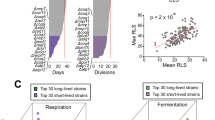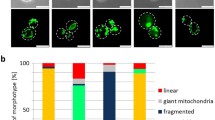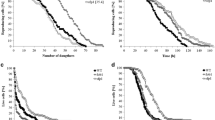Abstract
We studied the importance of respiratory fitness in S. cerevisiae lifespan, response to caloric restriction (CR) and mtDNA stability. Mutants harboring mtDNA instability and electron transport defects do not respond to CR, while tricarboxylic acid cycle mutants presented extended lifespans due to CR. Interestingly, mtDNA is unstable in cells lacking dihydrolipoyl dehydrogenase under CR conditions, and cells lacking aconitase under standard conditions (both enzymes are components of the TCA and mitochondrial nucleoid). Altogether, our data indicate that respiratory integrity is required for lifespan extension by CR and that mtDNA stability is regulated by nucleoid proteins in a glucose-sensitive manner.
Similar content being viewed by others
References
Baker KP, Schatz G (1991) Nature 349:205–208
Barea F, Bonatto D (2009) Mech Ageing Dev 130:444–460
Barros MH, Bandy B, Tahara EB, Kowaltowski AJ (2004) J Biol Chem 279:49883–49888
Barros MH, da Cunha FM, Oliveira GA, Tahara EB, Kowaltowski AJ (2010) Mech Ageing Dev 131:494–502
Bitterman KJ, Medvedik O, Sinclair DA (2003) Microbiol Mol Biol Rev 67:376–399
Brachmann CB, Davies A, Cost GJ, Caputo E, Li J, Hieter P, Boeke JD (1998) Yeast 14:115–132
Brewer LR, Friddle R, Noy A, Baldwin E, Martin SS, Corzett M, Balhorn R, Baskin RJ (2003) Biophys J 85:2519–2524
Cerqueira FM, Laurindo FR, Kowaltowski AJ (2011) PLoS One 31:e18433
Chapman KB, Solomon SD, Boeke JD (1992) Gene 118:131–136
Chen XJ, Wang X, Kaufman BA, Butow RA (2005) Science 307:714–717
DeRisi JL, Iyer VR, Brown PO (1997) Science 278:680–686
Dickinson JR, Roy DJ, Dawes IW (1986) Mol Gen Genet 204:103–107
Diffley JF, Stillman B (1991) Proc Natl Acad Sci USA 88:7864–7868
Diffley JF, Stillman B (1992) J Biol Chem 267:3368–3374
Fabrizio P, Longo VD (2003) Aging Cell 2:73–81
Fabrizio P, Li L, Longo VD (2005) Mech Ageing Dev 126:11–16
Falkenberg M, Larsson NG, Gustafsson CM (2007) Annu Rev Biochem 76:679–699
Ferguson LR, von Borstel RC (1992) Mutat Res 265:103–148
Fernández E, Moreno F, Rodicio R (1992) Eur J Biochem 204:983–990
Fontana L, Partridge L, Longo VD (2010) Science 328:321–326
Foury F, Tzagoloff A (1976) Eur J Biochem 68:113–119
Foury F, Roganti T, Lecrenier N, Purnelle B (1998) FEBS Lett 440:325–331
Frick O, Wittmann C (2005) Microb Cell Fact 4:30
Gancedo JM (1998) Yeast carbon catabolite repression. Microbiol Mol Biol Rev 62:334–361
Gangloff SP, Marguet D, Lauquin GJ (1990) Mol Cell Biol 10:3551–3561
Goldberg AA, Bourque SD, Kyryakov P, Gregg C, Boukh-Viner T, Beach A, Burstein MT, Machkalyan G, Richard V, Rampersad S, Cyr D, Milijevic S, Titorenko VI (2009) Exp Gerontol 44:555–571
Gombert AK, Moreira dos Santos M, Christensen B, Nielsen J (2001) J Bacteriol 183:1441–1451
Jazwinski SM (2002a) Exp Gerontol 37:1141–1146
Jazwinski SM (2002b) Annu Rev Microbiol 56:769–792
Jiang JC, Jaruga E, Repnevskaya MV, Jazwinski SM (2000) FASEB J 14:2135–2147
Kaeberlein M, Hu D, Kerr EO, Tsuchiya M, Westman EA, Dang N, Fields S, Kennedy BK (2005) PloS Genet 1:e69
Kao LR, Megraw TL, Chae CB (1993) Proc Natl Acad Sci USA 90:5598–5602
Katic M, Kennedy AR, Leykin I, Norris A, McGettrick A, Gesta S, Russell SJ, Bluher M, Maratos-Flier E, Kahn CR (2007) Aging Cell 6:827–839
Kenyon C (2001) Cell 105:165–168
Klein CJ, Olsson L, Nielsen J (1998) Microbiology 144:13–24
Kucej M, Kucejova B, Subramanian R, Chen XJ, Butow RA (2008) J Cell Sci 121:1861–1868
Lin SJ, Guarente L (2006) PLoS Genet 2:e33
Lin SJ, Defossez PA, Guarente L (2000) Science 289:2126–2128
Linnane AW, Haslam JM, Lukins HB, Nagley P (1972) Annu Rev Microbiol 26:163–198
Linnane AW, Marzuki S, Ozawa T, Tanaka M (1989) Lancet 25:642–645
Lipinski KA, Kaniak-Golik A, Golik P (2010) Biochim Biophys Acta 1797:1086–1098
López-Lluch G, Hunt N, Jones B, Zhu M, Jamieson H, Hilmer S, Cascajo MV, Allard J, Ingram DK, Navas P, de Cabo R (2006) Proc Natl Acad Sci USA 103:1768–1773
MacLean M, Harris N, Piper PW (2001) Yeast 18:499–509
McAlister-Henn L, Thompson LM (1987) J Bacteriol 169:5157–5166
Miyakawa I, Aoi H, Sando N, Kuroiwa T (1984) J Cell Sci 66:21–38
Müller I, Zimmermann M, Becker D, Flömer M (1980) Mech Ageing Dev 12:47–52
Newman SM, Zelenaya-Troitskaya O, Perlman PS, Butow RA (1996) Nucleic Acids Res 24:386–393
Nisoli E, Tonello C, Cardile A, Cozzi V, Bracale R, Tedesco L, Falcone S, Valerio A, Cantoni O, Clementi E, Moncada S, Carruba MO (2005) Science 310:314–317
Oliveira GA, Tahara EB, Gombert AK, Barros MH, Kowaltowski AJ (2008) J Bioenerg Biomembr 40:381–388
Piper PW (2006) Yeast 23:215–226
Repetto B, Tzagoloff A (1989) Mol Cell Biol 9:2695–2705
Reverter-Branchat G, Cabiscol E, Tamarit J, Ros J (2004) J Biol Chem 279:31983–31989
Rickwood D, Chambers JA, Barat M (1981) Exp Cell Res 133:1–13
Sadler I, Suda K, Schatz G, Kaudewitz F, Haid A (1984) EMBO J 3:2137–2143
Saltzgaber-Muller J, Kunapuli SP, Douglas MG (1983) J Biol Chem 258:11465–11470
Samokhvalov V, Ignatov V, Kondrashova M (2004) Biochimie 86:39–46
Schaffrath R, Breunig KD (2000) Fungal Genet Biol 30:173–190
Sidhu A, Beattie DS (1983) J Biol Chem 258:10649–10656
Sinclair D, Mills K, Guarente L (1998) Annu Rev Microbiol 52:533–560
Slonimski PP, Tzagoloff A (1976) Eur J Biochem 61:27–41
Smith DL Jr, McClure JM, Matecic M, Smith JS (2007) Aging Cell 6:649–662
Stuart RA, Gruhler A, van der Klei I, Guiard B, Koll H, Neupert W (1994) Eur J Biochem 220:9–18
Tahara EB, Barros MH, Oliveira GA, Netto LE, Kowaltowski AJ (2007) FASEB J 21:274–283
Trifunovic A, Wredenberg A, Falkenberg M, Spelbrink JN, Rovio AT, Bruder CE, Bohlooly-Y M, Gidlöf S, Oldfors A, Wibom R, Törnell J, Jacobs HT, Larsson NG (2004) Nature 429:417–423
Tzagoloff A, Dieckmann CL (1990) Microbiol Rev 54:211–225
Tzagoloff A, Akai A, Needleman RB (1975) J Biol Chem 250:8236–8242
Zelenaya-Troitskaya O, Perlman PS, Butow RA (1995) EMBO J 14:3268–3276
Author information
Authors and Affiliations
Corresponding author
Rights and permissions
About this article
Cite this article
Tahara, E.B., Cezário, K., Souza-Pinto, N.C. et al. Respiratory and TCA cycle activities affect S. cerevisiae lifespan, response to caloric restriction and mtDNA stability. J Bioenerg Biomembr 43, 483–491 (2011). https://doi.org/10.1007/s10863-011-9377-0
Received:
Accepted:
Published:
Issue Date:
DOI: https://doi.org/10.1007/s10863-011-9377-0




